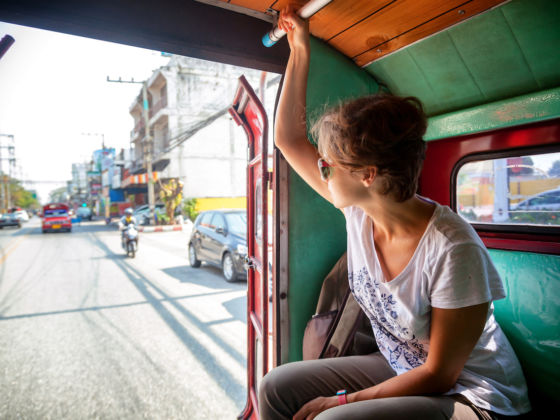Traveling by bus is often the most affordable way to get around a foreign country, but it can also be one of the most grueling. Price or a lack of viable alternatives may be the only reasons you’re even considering this mode of travel. But, regardless of why you’re taking the low road (or the long road), it doesn’t have to be a journey of exasperating proportions. With a little planning, common sense, and luck, your bus experience may just become the highlight of your trip. Or, at the very least, a great story to impress your friends. Here how to make your bus journey a little less bumpy.

1. Ask yourself if taking the bus is a sensible choice.
If you only have a week in-country and the bus is going to be 18 hours each way, it probably doesn’t make sense to choose this mode of transportation. If time isn’t a concern, the bus is a great way to see the countryside you’d miss 30,000 feet up in the air. Other things worth considering are cost, weather, and road safety. If the bus saves you $20 but takes you over mountain roads that you’ve heard from fellow travelers are sketchy, you may want to reconsider. Weather is always a safety factor as well, particularly in winter or rainy seasons. Before making the final decision to travel by bus, know where you’re going, what hazards lie ahead, and always proceed with caution.
2. Buy tickets ahead of time (when you can).
As a general rule, you can buy advance tickets in most western countries. In Asia, however, the idea of buying tickets early is often impossible. The best thing to do in order to ensure you get the right tickets at the right price is to talk to someone at your hotel to see what they recommend. Also, Google the route ahead of time and learn as much as you can about the company, the road conditions, and the departure schedule. Reading reviews is key — advice from other travelers may be the only honest opinion you’re going to find.
Knowing what route or company you’re looking for can help out a lot once you get to the terminal. Be cautious of anyone who approaches you at the terminal with advice or “unofficial” tickets. If you can’t get tickets from your hotel or hostel, always buy from an operator’s booth from someone in uniform.
3. Scope out the terminal.
Use the time waiting for your bus to observe the terminal and get a feel for the ebb and flow of traffic, as well as how buses load and unload. This is especially helpful in chaotic bus stations. Also, use the bathroom while you can. Some buses don’t have them and plenty of others have some that don’t work. Long-haul buses in many countries are decommissioned school buses from western countries that the bus company has modified to fit their needs, and certainly don’t offer much in the way of amenities.
4. Keep your bags safe.
Chaotic bus stations can overwhelm even the most seasoned travelers. Keep all absolutely vital and expensive gear (passports, phone, etc) on you at all times. If you must load your bags, stay with your gear long enough to ensure it gets on the bus. Try and load yours first so they’re near the back of the storage container. This makes it less likely your stuff will wander off during planned or unplanned stops.
5. Stretch your legs whenever you can.
Buses will stop numerous times on long trips. If you can get off without the danger of losing your seat, do so. It’s a great chance to use the bathroom or grab some food or water. Just don’t be the annoying traveler that takes a half hour to order a sandwich and holds everyone else up.
6. Keep your eyes open.
Tourists on buses are juicy targets for pickpockets and other travel villains. Once on board, many travelers let their guard down and take their eyes off the prize. Always keep your most important documents and electronics on your person, and don’t assume that your stuff is safe under or above your seat. Know where your bag is at all times and consider using a bungee cord to connect the bag to yourself or to the seat. That way, you’ll feel if someone starts poking around.
7. Trust your gut.
If you don’t like the condition of the bus, the road, the weather, or even the driver, don’t get in. there’s almost always an alternative. As is the case with most elements of international travel, particularly when by yourself, intuition plays a big role. Learn to trust your gut.
8. When in doubt, do what everyone else is doing.
Not sure when to board? Watch others. Unsure of bus etiquette? Observe what other passengers are doing. Don’t know how long the bus break will last? Keep an eye on someone else from your group. Every country has its own unique, unwritten bus culture rules, so if it’s your first time, just follow everyone else’s example.
9. Don’t forget to have fun.
In many cases, bus trips can be the best way to get to know a country. You see a lot more of the landscape and you meet interesting folks. Strike up a conversation and you’ll get first-hand information on where you’re going.